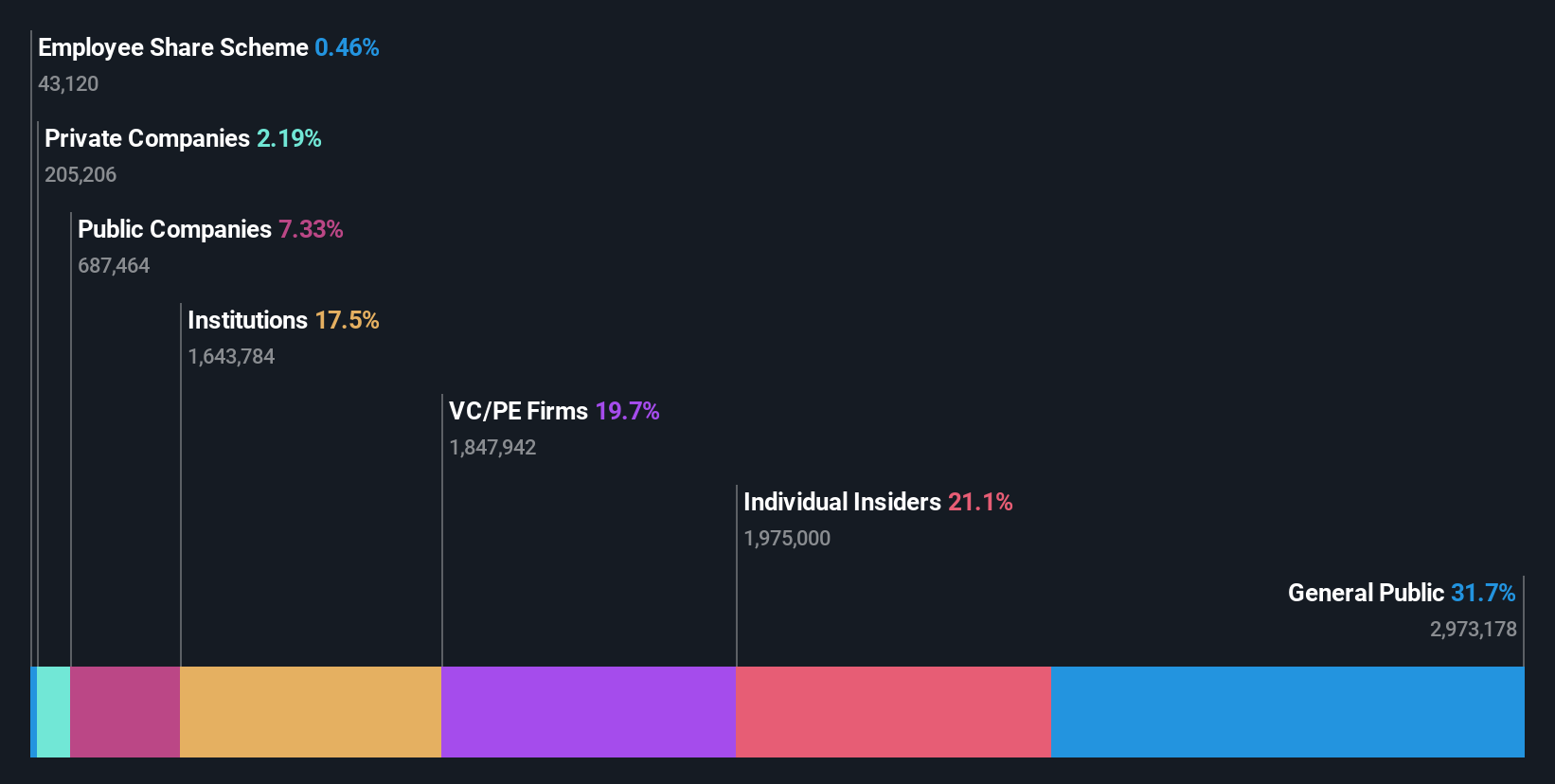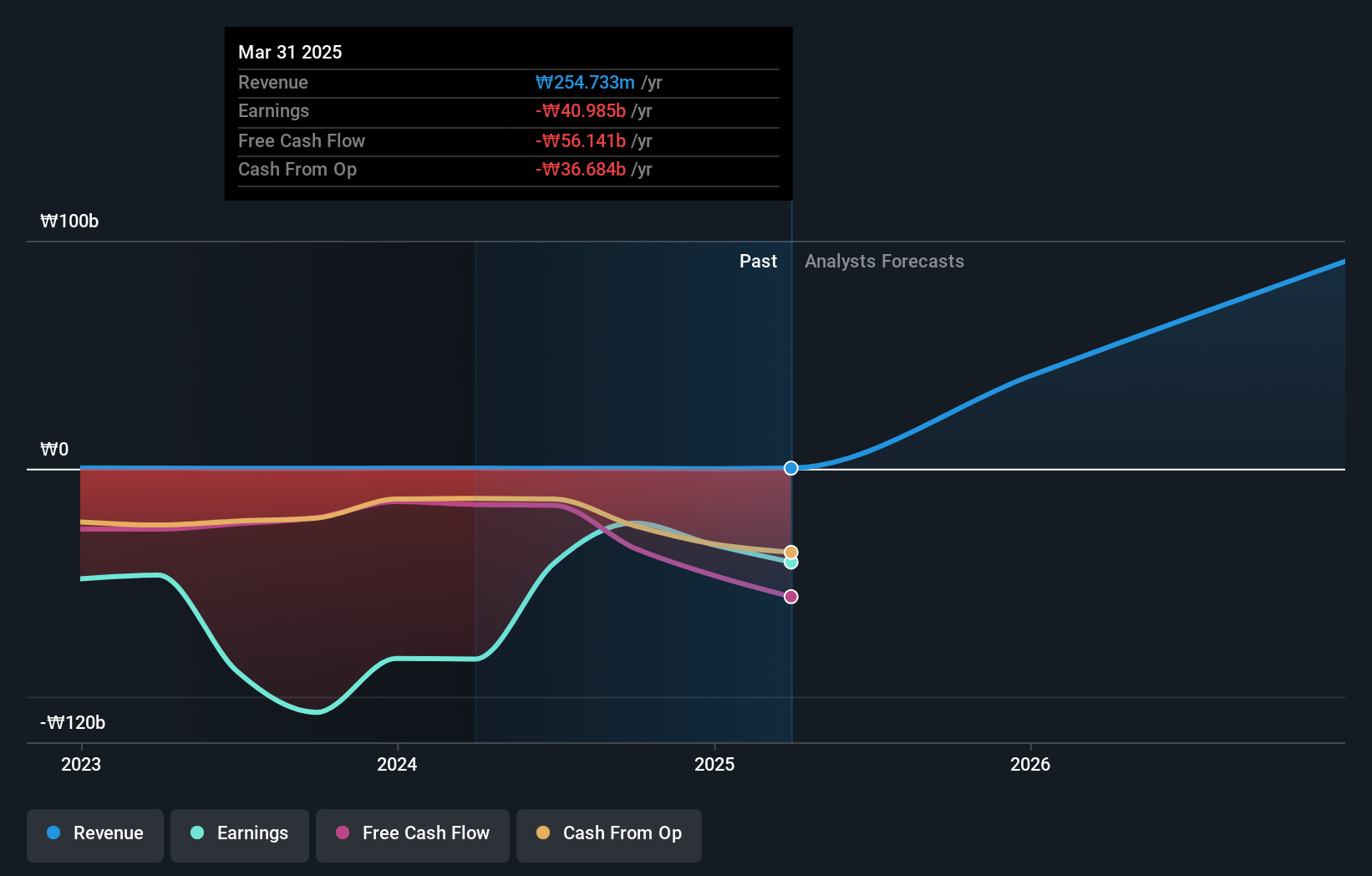- South Korea
- /
- Aerospace & Defense
- /
- KOSDAQ:A462350
INNOSPACE Co., Ltd.'s (KOSDAQ:462350) market cap dropped ₩33b last week; Individual investors bore the brunt

Key Insights
- INNOSPACE's significant individual investors ownership suggests that the key decisions are influenced by shareholders from the larger public
- The top 6 shareholders own 52% of the company
- Insider ownership in INNOSPACE is 21%
A look at the shareholders of INNOSPACE Co., Ltd. (KOSDAQ:462350) can tell us which group is most powerful. We can see that individual investors own the lion's share in the company with 32% ownership. That is, the group stands to benefit the most if the stock rises (or lose the most if there is a downturn).
While insiders who own 21% came under pressure after market cap dropped to ₩167b last week,individual investors took the most losses.
Let's delve deeper into each type of owner of INNOSPACE, beginning with the chart below.
Check out our latest analysis for INNOSPACE

What Does The Institutional Ownership Tell Us About INNOSPACE?
Institutions typically measure themselves against a benchmark when reporting to their own investors, so they often become more enthusiastic about a stock once it's included in a major index. We would expect most companies to have some institutions on the register, especially if they are growing.
INNOSPACE already has institutions on the share registry. Indeed, they own a respectable stake in the company. This implies the analysts working for those institutions have looked at the stock and they like it. But just like anyone else, they could be wrong. When multiple institutions own a stock, there's always a risk that they are in a 'crowded trade'. When such a trade goes wrong, multiple parties may compete to sell stock fast. This risk is higher in a company without a history of growth. You can see INNOSPACE's historic earnings and revenue below, but keep in mind there's always more to the story.

INNOSPACE is not owned by hedge funds. Looking at our data, we can see that the largest shareholder is Sujong Kim with 21% of shares outstanding. With 7.5% and 7.0% of the shares outstanding respectively, IMM Investment, Corp. and Kolon Investment, Inc. are the second and third largest shareholders.
We did some more digging and found that 6 of the top shareholders account for roughly 52% of the register, implying that along with larger shareholders, there are a few smaller shareholders, thereby balancing out each others interests somewhat.
While it makes sense to study institutional ownership data for a company, it also makes sense to study analyst sentiments to know which way the wind is blowing. While there is some analyst coverage, the company is probably not widely covered. So it could gain more attention, down the track.
Insider Ownership Of INNOSPACE
The definition of an insider can differ slightly between different countries, but members of the board of directors always count. Company management run the business, but the CEO will answer to the board, even if he or she is a member of it.
Insider ownership is positive when it signals leadership are thinking like the true owners of the company. However, high insider ownership can also give immense power to a small group within the company. This can be negative in some circumstances.
It seems insiders own a significant proportion of INNOSPACE Co., Ltd.. Insiders have a ₩35b stake in this ₩167b business. This may suggest that the founders still own a lot of shares. You can click here to see if they have been buying or selling.
General Public Ownership
The general public, who are usually individual investors, hold a 32% stake in INNOSPACE. While this size of ownership may not be enough to sway a policy decision in their favour, they can still make a collective impact on company policies.
Private Equity Ownership
With an ownership of 20%, private equity firms are in a position to play a role in shaping corporate strategy with a focus on value creation. Some investors might be encouraged by this, since private equity are sometimes able to encourage strategies that help the market see the value in the company. Alternatively, those holders might be exiting the investment after taking it public.
Public Company Ownership
We can see that public companies hold 7.3% of the INNOSPACE shares on issue. It's hard to say for sure but this suggests they have entwined business interests. This might be a strategic stake, so it's worth watching this space for changes in ownership.

Next Steps:
It's always worth thinking about the different groups who own shares in a company. But to understand INNOSPACE better, we need to consider many other factors. For instance, we've identified 2 warning signs for INNOSPACE that you should be aware of.
But ultimately it is the future, not the past, that will determine how well the owners of this business will do. Therefore we think it advisable to take a look at this free report showing whether analysts are predicting a brighter future.
NB: Figures in this article are calculated using data from the last twelve months, which refer to the 12-month period ending on the last date of the month the financial statement is dated. This may not be consistent with full year annual report figures.
New: AI Stock Screener & Alerts
Our new AI Stock Screener scans the market every day to uncover opportunities.
• Dividend Powerhouses (3%+ Yield)
• Undervalued Small Caps with Insider Buying
• High growth Tech and AI Companies
Or build your own from over 50 metrics.
Have feedback on this article? Concerned about the content? Get in touch with us directly. Alternatively, email editorial-team (at) simplywallst.com.
This article by Simply Wall St is general in nature. We provide commentary based on historical data and analyst forecasts only using an unbiased methodology and our articles are not intended to be financial advice. It does not constitute a recommendation to buy or sell any stock, and does not take account of your objectives, or your financial situation. We aim to bring you long-term focused analysis driven by fundamental data. Note that our analysis may not factor in the latest price-sensitive company announcements or qualitative material. Simply Wall St has no position in any stocks mentioned.
About KOSDAQ:A462350
INNOSPACE
Operates as an aerospace/defense manufacturing and engineering service company in South Korea and internationally.
Mediocre balance sheet with limited growth.
Market Insights
Community Narratives



